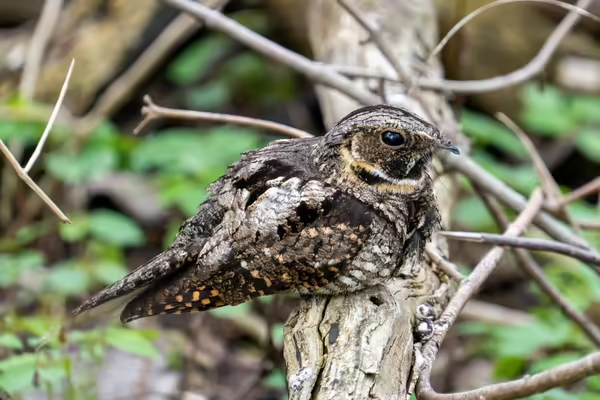
URBANA, Ill. — Often heard and rarely seen, the Eastern Whip-poor-will and its namesake nighttime call is an iconic Midwestern woodland bird. But like many other insect-eating birds, its numbers are declining.
University of Illinois avian researchers are working to uncover the secrets of where this elusive bird goes and what it does when it leaves Illinois to overwinter in Florida, Central, and South America to better understand its full annual cycle. Bird watchers and nature enthusiasts alike will get a better understanding of what’s happening to whip-poor-wills with a free webinar, “Uncovering the Winter Secrets of Whip-poor-wills” from University of Illinois Extension at 1 p.m. on Oct. 16. Sign up at go.illinois.edu/whippoorwills.
The session will be led by Illinois Extension natural resources, environment, and energy staff and presented by Dave Edlund, coordinator of the Midwest Eastern Whip-poor-will Project and a natural resources and environmental sciences graduate student at University of Illinois.
If you need a reasonable accommodation to participate in this webinar, contact Erin Garrett at emedvecz@illinois.edu. Early requests are strongly encouraged to allow sufficient time to meet your access needs. All sessions are recorded and available to watch on YouTube within a few weeks.
Everyday Environment explores the intricate web of connections that bind us to the natural world. From water, air, energy, plants, and animals to the complex interactions within these elements, we aim to unravel the ties that link us to our environment through podcasts, blogs, webinars, and videos. The fall 2025 series explores Illinois wildlife and the birds, mammals, amphibians, and other creatures we share the state with. Get program updates by subscribing to the Everyday Environment newsletter at go.illinois.edu/EESubscribe.
To connect with Extension natural resources, environment, and energy staff about a program or for a consultation, visit go.illinois.edu/NREEstaff. Extension’s natural resources, environment, and energy program provides research-based education for awareness and action to sustain healthy environments and ecosystems that support quality living and resilient communities. Extension staff empower people across Illinois to make a difference through the Master Naturalist, Climate Steward, and Watershed Steward volunteer and training programs.
University of Illinois Extension develops educational programs, extends knowledge, and builds partnerships to support people, communities, and their environments as part of the state's land-grant institution. Extension serves as the leading public outreach effort for University of Illinois Urbana-Champaign and the College of Agricultural, Consumer and Environmental Sciences in all 102 Illinois counties through a network of 27 multi-county units and over 700 staff statewide. Extension’s mission is responsive to eight strategic priorities — community, economy, environment, food and agriculture, health, partnerships, technology and discovery, and workforce excellence — that are served through six program areas — 4-H youth development, agriculture and agribusiness, community and economic development, family and consumer science, integrated health disparities, and natural resources, environment, and energy.